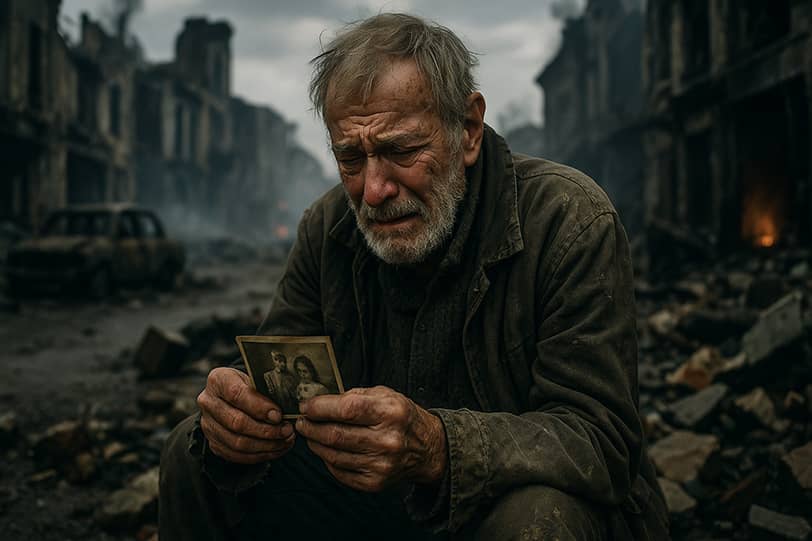Imagine a woman, let’s call her Anna. For the past two years, she has been living in a state of constant tension: alarming news in the morning, nighttime sirens, endless conversations about war at the family dinner table. At first, she managed—she worked, supported her children, even found the strength to comfort her friends. But now she feels her inner resources dwindling: her sleep has become fragmented, irritation flares up over small things, and the future seems like a tunnel with no exit. A familiar story?
The main question tormenting not only Anna but thousands of others: what to do if the war doesn’t end tomorrow, but in a month, a year, 5 years—and how to preserve oneself in this prolonged nightmare? Chronic stress is a sneaky enemy. It doesn’t strike sharply, like grief, but slowly eats away at the psyche: it reduces concentration, kills motivation, and turns even simple tasks into insurmountable challenges. But there’s good news: the human psyche can adapt even to the harshest conditions—you just need to understand how to help it.
This article isn’t about temporary advice on “how to cope with anxiety,” but about survival strategies for a long-term crisis reality. We’ll break down how to recognize signs of exhaustion, which daily practices actually work, and why it’s so important sometimes to allow yourself weakness. Because preserving your sanity isn’t a heroic feat—it’s a series of small but crucial choices we make every day.

Signs That Your Mental Health Is at Risk (Self-Assessment)
War is not just external events—it’s also an internal storm that gradually alters our psychological state. Many notice that they’ve become different: they tire more quickly, react more sharply to small things, lose interest in what once brought them joy. This is a normal response to abnormal circumstances. But it’s crucial to recognize when ordinary stress escalates into a dangerous condition that threatens our mental well-being.
Before diving into specific symptoms, it’s important to understand: your struggles are not a sign of weakness but signals from your body. Just as pain alerts us to physical injury, these signs warn of psychological overload. Let’s examine them in detail so you can clearly identify what exactly demands your attention.
Physical Symptoms
The body is always the first to react to stress. You may notice:
- Persistent sleep problems: Difficulty falling asleep, frequent nighttime awakenings, or, conversely, constant drowsiness.
- Chronic fatigue that doesn’t go away even after rest.
- Muscle tension, especially in the neck, shoulders, and jaw.
- Changes in appetite—loss of interest in food or, conversely, compulsive overeating.
- Headaches, digestive issues without clear medical causes.
These symptoms are particularly insidious because we often blame them on “bad weather” or “aging.” But if they persist for weeks—it’s a serious reason to reflect on your psychological state.
Emotional Symptoms
The emotional sphere suffers no less than the physical:
- Apathy—when nothing feels appealing, even things that once brought pleasure.
- Irritability—when every little thing sets you off.
- Guilt—toward those who “have it worse,” for allowing yourself to rest.
- Emotional swings—from rage to complete indifference in minutes.
- Loss of the ability to feel joy—even in response to good news.
A particularly alarming sign is if you notice you’ve grown indifferent to things that once stirred strong emotions (e.g., others’ suffering or art).
Cognitive Symptoms
Stress literally changes how the brain functions:
- Memory problems—forgetting simple things, names, dates.
- Difficulty concentrating—unable to finish an article or watch a movie.
- Intrusive thoughts—the same anxious scenarios replaying in your mind.
- Inability to make decisions—even simple everyday choices become agonizing.
- Slowed thinking—as if the brain is running at low capacity.
These changes often frighten people the most because they feel like signs of “losing oneself.” But it’s important to remember—these are temporary functional disruptions, not signs of deterioration.
Social Symptoms
Relationships with others reflect our inner state:
- Isolation—you want to shut everyone out, even loved ones.
- Increased conflicts—more frequent arguments with family and colleagues.
- Loss of interest in socializing—conversations feel meaningless.
- Sense of alienation—as if a wall has grown between you and others.
- Annoyance at others’ “normalcy”—when people go about their usual lives.
Social symptoms are especially dangerous because they deprive us of our greatest support in hard times—the closeness of others.

How to Reduce Daily Stress? (Practical Techniques)
When war becomes part of everyday life, our bodies remain in a constant state of high alert. It’s like carrying a heavy backpack with an extra brick added each day—at first, it’s unnoticeable, but after a month, it becomes hard to breathe. The good news: this weight can be lightened. Not with magic pills, but with simple yet systematic practices that help the nervous system reset.
Important to understand: this isn’t about eliminating stress completely (impossible under such conditions), but about creating a “buffer zone” for the psyche. Like reinforcing a dam before a flood. These methods are tested by psychologists and people living through crises. They don’t require special skills or much time—just your willingness to care for yourself.
Information Hygiene
In an information war, our brains are constantly bombarded with distressing messages. Here’s how to build a protective barrier:
Strict news limits:
- Set 2 specific times per day (e.g., 10:00 and 18:00).
- Use a 15-minute timer—once time’s up, close all news tabs.
- Disable push notifications from news apps.
Quality over quantity:
- Choose 1-2 trusted sources (don’t read everything).
- Avoid “sensational” headlines and unverified information.
- Before reading, ask: “Do I really need this information?”
- Unfollow or mute toxic groups/channels.
- Curate a “clean” social media feed—follow nature, science, or art accounts.
- No news before bed (at least 2 hours prior).
Emergency Calming Techniques
When anxiety hits suddenly, these proven methods help:
4-7-8 Breathing:
- Sit comfortably, back straight.
- Inhale through your nose for 4 counts (belly expands).
- Hold for 7 counts.
- Exhale slowly through pursed lips for 8 counts (like blowing out a candle).
- Repeat 4-5 cycles.
5-4-3-2-1 Grounding Technique:
Look around and identify:
- 5 different objects (notice details).
- 4 distinct sounds (even faint ones—clock, your breath).
- 3 tactile sensations (fabric texture, breeze).
- 2 smells.
- 1 taste (put something in your mouth).
This brings your mind back to the “here and now.”
“Containing” Anxiety:
- Take paper, split into 2 columns.
- Left column: write anxious thoughts (“What if…”).
- Right column: list facts (“Right now, I’m safe, I have…”).
- Tear up or burn the left column.
Daily Routine
Amid chaos, preserve islands of stability:
Sleep:
- Go to bed and wake at consistent times.
- Create a pre-sleep ritual (tea, book, light stretching).
- If unable to sleep, get up and read (don’t force it).
Nutrition:
- At least 2 proper meals daily.
- Drink more water (dehydration worsens anxiety).
- Limit alcohol and coffee (they amplify stress).
Physical Activity:
- 10-15 minutes daily is enough (walk, stretch).
- Simple exercises (desk squats, shoulder rolls).
- Movement helps “shake off” tension.
Key point: Don’t try to implement everything at once. Pick 1-2 manageable items and start there. Even 5 minutes of breathing exercises or a short walk is a victory. Your goal isn’t perfection—it’s consistency. Like brushing teeth: a small but daily act for health.

How to Cope with Anxiety About the Future? (Working with Thoughts)
Worrying about the future during war is like trying to peer through a fogged-up window: we strain our eyes but only see blurred outlines of potential threats. Our brain, faced with uncertainty, starts generating dozens of anxious scenarios like an overloaded computer. Even if we’re physically safe at this moment, mentally we’re already living through every possible catastrophe our consciousness can conjure.
It’s important to understand: anxiety about the future isn’t weakness or a character flaw. It’s a normal psychological response to abnormal circumstances. But the good news is we can learn to redirect this survival mechanism so it doesn’t destroy us from within. Let’s examine specific strategies to regain control over our thoughts.
Accepting Uncertainty
Accepting uncertainty isn’t surrender—it’s strategic regrouping. Here’s how:
Define spheres of influence:
Take paper and draw two circles (one inside the other):
- Inner circle: what I can control (my reactions, my actions today).
- Outer circle: what I can’t control (the war’s course, politicians’ decisions).
Focus energy on the inner circle.
Reframe questions:
- Instead of: “When will this end?” → “Today I can…”
- Instead of: “What will happen tomorrow?” → “What can I do right now?”
“Here and Now” practice:
When catching anxious thoughts, ask: “Where am I physically right now? Am I safe at this moment?”
Name 3 safe objects around you aloud.
Focus on Small Goals
Amid global instability, the brain needs “anchors”:
Time segmentation:
- Plan by days, not months.
- Make simple daily lists (3-5 items).
- Include basic needs: “shower,” “cook a meal.”
Micro-achievements:
Note completed tasks (even “got out of bed”).
Use the “tiny steps” method:
- Want to start running? Today—just put on sneakers.
- Need a job? Today—update your resume.
Stability rituals:
Create “anchors”—repetitive actions:
- Morning coffee in silence.
- 10-minute evening journaling.
- Weekly call to a friend.
The “Stop-Catastrophizing” Method
When your mind paints apocalyptic scenarios:
“Freeze-frame” technique:
- When anxiety spirals, mentally shout “Stop!”
- Visualize a red traffic light.
- Acknowledge: “I’m catastrophizing.”
Scenario analysis:
Write down your worst-case scenario.
Ask:
- How likely is this?
- How have I coped before?
- Who could help me here?
Plan B:
For each fear, create a contingency: “If X happens—I’ll do Y.”
Example: “If evacuation occurs—I have a go-bag ready.”
Remember: Your anxiety is your psyche’s overloaded survival mode. These methods are like an instruction manual for recalibrating your internal security system. They don’t promise instant peace but gradually restore your ability to live, not just survive. Start with one simple exercise today—it’s already a step toward no longer being hostage to your fears.

How Not to Lose Yourself? (Preserving Identity)
In prolonged crises, a slow but dangerous erosion of one’s sense of self occurs. It’s like looking into a foggy mirror—the outlines are familiar, but clarity is lost. Many notice they gradually stop recognizing themselves: old interests fade, habits blur, and answering “What do you want?” becomes difficult. This is psychological self-preservation—the psyche conserves resources by cutting “excess.” But these very “excesses” are your personality, your uniqueness—what makes life worth living.
Preserving yourself isn’t a luxury but a necessity. Like an oxygen mask on a plane: secure yours first, then help others. This section is about remaining not just a survivor during war, but a living person. About simple yet powerful ways to remind yourself: “I am not just my pain and fear. I am also…”.
Find “Anchors”
Anchors are simple actions or objects connecting you to your “pre-crisis” identity:
Body rituals:
- Morning routine: coffee/tea in silence + 5 minutes by the window.
- Body care: post-shower lotion, 100 hairbrush strokes.
- “Dress for the day”: occasionally swap pajamas for “outside” clothes.
Creative practices:
Journal in any format:
- One paragraph about your state.
- “What I noticed today” list.
- Doodle drawings to express emotions.
Listen to music from your “past life”—what you loved pre-war.
Revisit old photo albums (digital/printed).
Mini-hobbies:
Revive old interests in micro-formats:
- Loved cooking? Try one new recipe monthly.
- Enjoyed gardening? Grow green onions on a windowsill.
“Sampler” new activities:
- 15 minutes/day learning a language.
- Watching lectures on interesting topics.
Support from Loved Ones
Relationships are powerful self-help tools when structured mindfully:
Express feelings:
Use “I-statements”:
- “I feel…” instead of “You annoy me…”
- “I need…” instead of “You never…”
Ask unconventional questions:
- “What surprised you today?”
- “What was your brightest moment today?”
Shared online activities:
- Virtual dinners: Cook the same dish and eat together via video call.
- Synchronized movie watching.
- Online games (chess, Scrabble, mobile games).
Create new traditions:
- Sunday tea with a specific blend.
- Exchanging books/music/films with discussions.
- Co-writing a “gratitude journal.”
Key point: These practices may seem trivial against global events. But your identity is built precisely from such “trifles.” Like a mosaic—one bead means nothing, but together they create a unique pattern. Choose 1-2 most resonant items and begin. Your goal isn’t to recover your “old self” but to create conditions for your “I” to evolve rather than crumble.

When Is Professional Help Needed? (Red Flags)
War creates extreme conditions where even the strongest psyche can falter. How do you know when your state has moved beyond “normal” stress and requires specialized support? Imagine your psyche as a house. Ordinary stress is like bad weather outside: wind, rain, but the walls hold. When load-bearing structures begin collapsing—that’s the signal to call professionals.
Many delay seeking help, thinking “others have it worse” or “I should handle this alone.” This is a dangerous misconception. Professional psychological help during war isn’t a luxury—it’s a necessity, like medical care for serious trauma. Let’s examine specific signs indicating you need specialist support.
PTSD Symptoms
Involuntary flashbacks:
- Vivid, intrusive memories of traumatic events
- Feeling like the event is happening again “here and now”
- Physical reactions (rapid heartbeat, sweating) when remembering
Emotional numbness:
- Inability to feel positive emotions
- Detachment from others
- Loss of interest in previously enjoyable activities
Hyperarousal:
- Constant “fight-or-flight” alertness
- Excessive startle response (jumping at sudden sounds)
- Sleep and concentration problems
Avoidance behavior:
- Consciously avoiding trauma reminders
- Inability to recall key aspects of the traumatic event
Depression Symptoms
Persistent low mood:
- Hopelessness, emptiness most of the day
- Crying without reason or inability to cry
- Loss of pleasure capacity
- “I don’t want anything”—even formerly loved activities
Appetite/weight changes:
- Significant weight loss/gain without dieting
- Loss of appetite or compulsive overeating
Psychomotor issues:
- Noticeably slowed movements/speech
- Or conversely—restlessness, inability to sit still
Death thoughts:
- Frequent thoughts about death (not necessarily suicide)
- Thinking “others would be better off without me”
Where to Find Help
Free hotlines:
- 24/7 psychological support lines
- Anonymous, confidential, often multilingual
NGOs/charities:
- Free consultations with qualified specialists
- Group therapy for trauma survivors
Online resources:
- Self-help apps with CBT techniques
- Moderated support forums/groups
Government services:
- Social-psychological support centers
- Crisis counseling in hospitals
Important: If you experience several symptoms persisting over 2 weeks and disrupting daily life—this warrants professional help. Remember—seeking help demonstrates wisdom and self-care, not weakness. Your mental health matters as much as physical health.

Conclusion
War reshapes reality, forcing us into permanent emergency mode. Yet even here, we retain a crucial right—the right to care for our mental state. Remember: your capacity to feel exhaustion, anxiety and pain isn’t weakness—it proves your humanity in inhuman circumstances.
Choose just one or two strategies we’ve discussed. Start small, but start today. These minor steps, like ripples in water, will gradually create an inner safe space. Don’t seek perfect execution—in current conditions, “good enough” is already heroic.
You’re not alone in this struggle. Thousands now feel the same, with dozens of organizations ready to help. Sometimes one timely conversation can prevent crisis. Your psyche is a frontline like any other—it deserves equal protection.
War will eventually end, but you’ll continue living—with all these memories, experiences and trauma. How you care for yourself during darkest times significantly shapes your “after.” Today is already the beginning of that future, built through your small but crucial choices.
Start with breathing. Start with a five-minute pause. Start by acknowledging: “I’m struggling, and that’s normal.” This is resistance—preserving your humanity when war tries to steal it.




